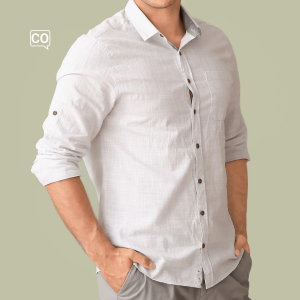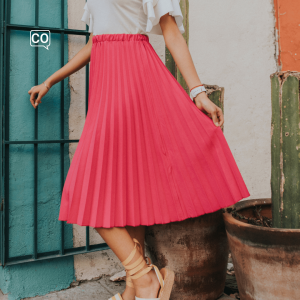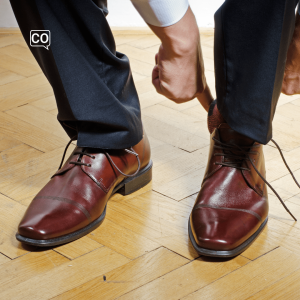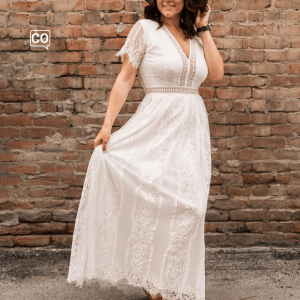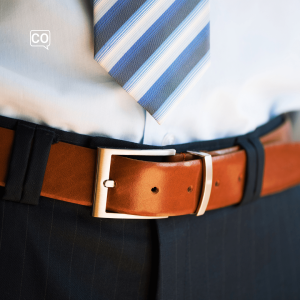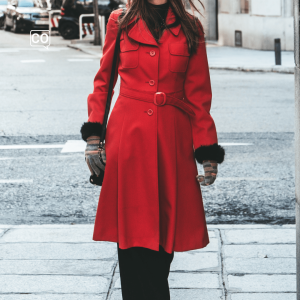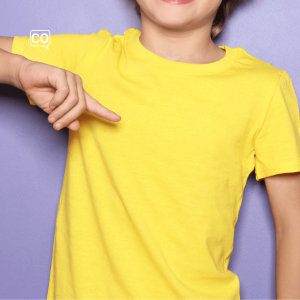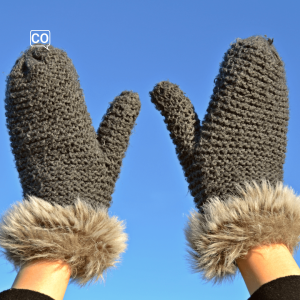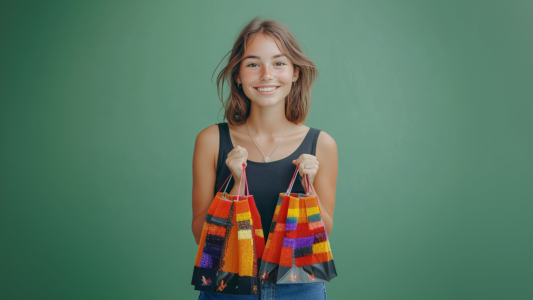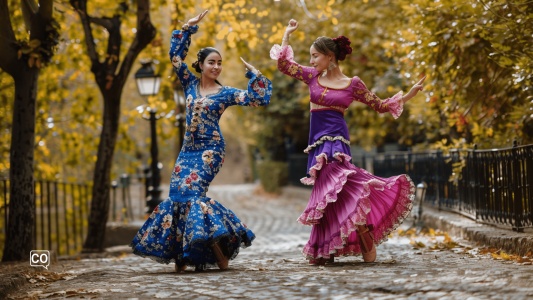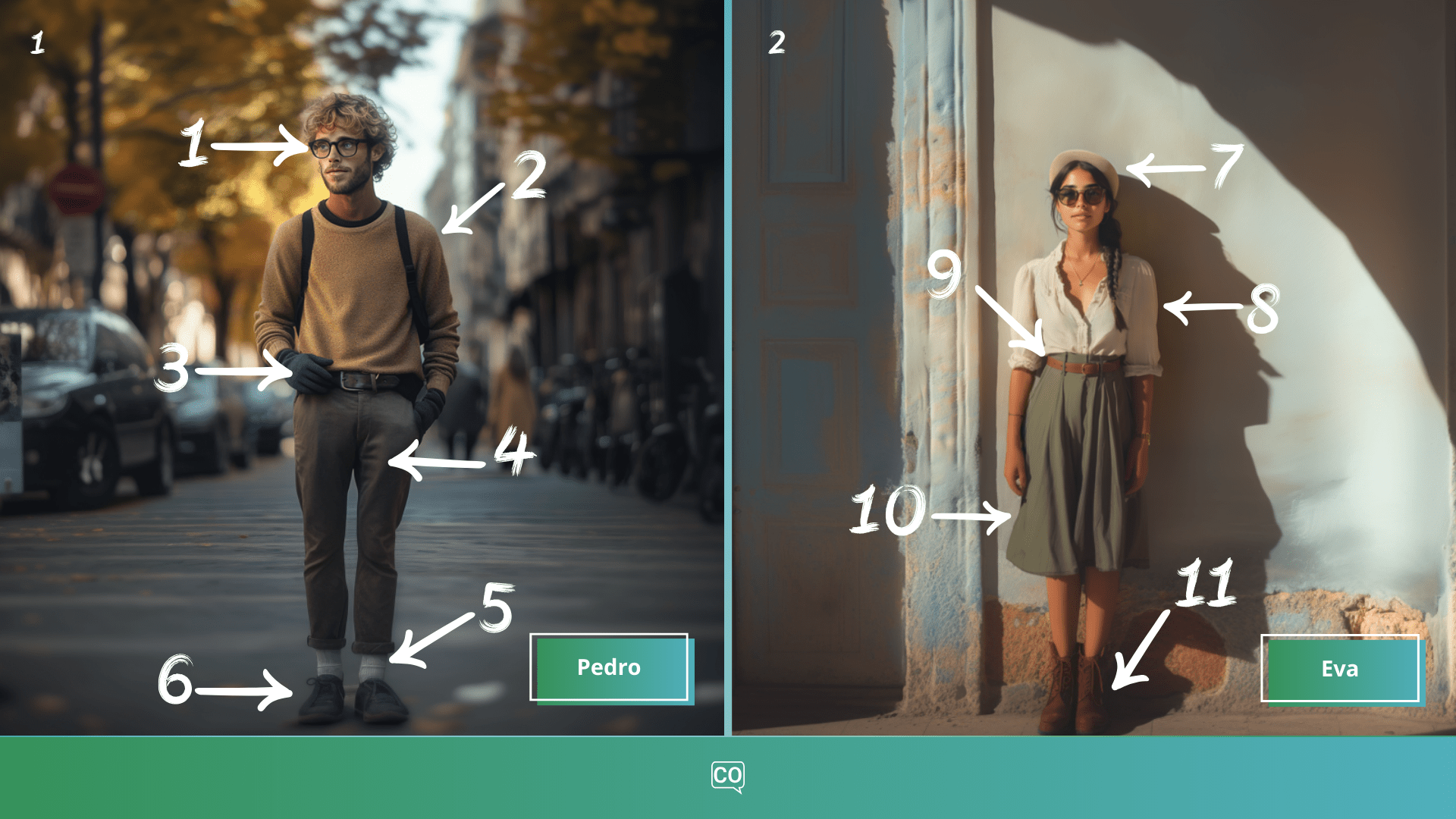Ropa
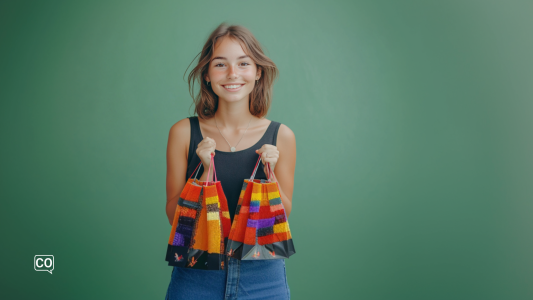
Learning goals:
- Describe la ropa de las personas (Describe people's clothing )
- Vocabulario de ropa (Clothing vocabulary)
- Los verbos modales (deber, poder, querer...) (Modal verbs (should, can, want...))
- El traje de flamenca (The flamenco dress)
Learning module 3 (A1): Día a día (Day to day)
Recap exercises of the previous lesson
Teaching guidelines +/- 60 minutes
Core vocabulary (15)
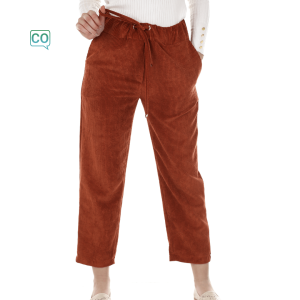
Él quiere llevar el pantalón negro hoy.
(He wants to wear the black trousers today.)
Los pantalones
(The trousers)
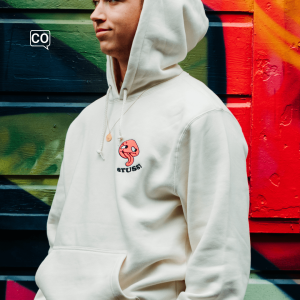
Él quiere llevar el jersey a la fiesta.
(He wants to wear the jumper to the party.)
El jersey
(The sweater)
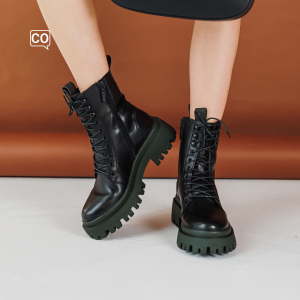
Debo ponerte la bota antes de salir.
(I must put your boot on before going out.)
Las botas
(The boots)

Debes ponerte el gorro cuando hace frío.
(You must put on your hat when it's cold.)
El gorro
(The hat)

Yo debo llevar las gafas cuando salgo.
(I must wear the glasses when I go out.)
Las gafas
(The glasses)
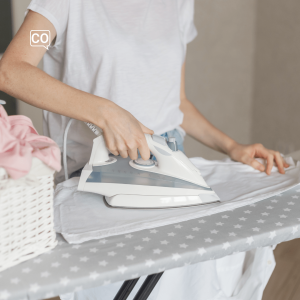
Él plancha su uniforme escolar por la mañana.
(He irons his school uniform in the morning.)
Planchar
(To iron)
Listening materials
Our listening materials implement the verbs, vocabulary and grammar topics of this lesson. Audio and video available!
A1.21.1 Diálogo: Ana y Pedro se van de compras
Spanish A1.21.1 Ana and Pedro are going shopping
Aprende los colores con Ana y Pedro comprando ropa.
(Learn the colours with Ana and Pedro by buying clothes.)
Teaching guidelines +/- 15 minutes
A1.21.2 Gramática: Los verbos modales (deber, poder, querer...)
Spanish A1.21.2 Modal verbs (should, can, want...)
(Modal verbs express attitudes and needs related to the actions performed by the subject in the sentence.)
Teaching guidelines +/- 15 minutes
A1.21.3 Cultura: El traje de flamenca
Spanish A1.21.3 The flamenco dress
Descubre el traje de flamenca en España, un vestido tradicional con todos sus accesorios: volantes, mantón, zapatos, flor, pendientes.
(Discover the flamenco dress in Spain, a traditional outfit with all its accessories: ruffles, shawl, shoes, flower, earrings.)
Teaching guidelines +/- 10 minutes
Exercises
These exercises can be done together during conversation lessons or as homework.
Exercise 1: Find the words
Instruction: Find the words, mark them and make sentences with the words.
Show answers Show hintsHints
To iron , The hat , The sweater , The gloves , The dress , The t-shirt
Answers
Score: 0/6
| La camiseta | (The t-shirt) |
| Los guantes | (The gloves) |
| El jersey | (The sweater) |
| El gorro | (The hat) |
| El vestido | (The dress) |
| Planchar | (To iron) |
Exercise 2: Reorder sentences
Instruction: The words in these sentences have been shuffled! Sort them so that they make a valid sentence again and translate.
Show answers Show translationExercise 3: Translate and make sentences
Instruction: Translate the words and phrases below and use it in a conversation or text.
Show answersExercise 4: Translate and use in a sentence
Instruction: Translate and say the word out loud. Use the word in a sentence.
Show translation|
1.
Planchar
|
(To iron) |
|
2.
La falda
|
(The skirt) |
|
3.
Las gafas
|
(The glasses) |
|
4.
Los pantalones
|
(The trousers) |
|
5.
La camiseta
|
(The t-shirt) |
Exercise 5: Conjugación verbal
Instruction: Choose the correct word, read the sentence out loud and translate.
Show answers Show translationPlanchar (Presente, indicativo), Llevar (Presente, indicativo)
1. Vosotros ... las cortinas de la sala.
2. Nosotros ... nuestras camisas blancas.
3. Ellos ... unos zapatos blancos.
4. Nosotros ... unos guantes amarillos.
5. Tú ... una camisa negra.
Exercise 6: Modal verbs (should, can, want...)
Instruction: Choose the correct word, read the sentence out loud and translate.
Show answers Show translationquieres, saben, podéis, suele, debes, debe, suelo, puedes
1. Poder: ¿Tú ... coser la falda?
2. Soler: Él ... llevar gafas.
3. Poder: ¿Vosotros ... lavar la camiseta?
4. Deber: Tú ... llevar camisa a la boda.
5. Saber: Ellos no ... ponerse el gorro.
6. Soler: Yo ... ponerme las zapatillas.
7. Deber: Ella ... comprar un cinturón.
8. Querer: ¿Tú ... elegir el vestido?
Exercise 7: Translate and make sentences
Instruction: Translate the words and phrases below and use it in a conversation or text.
Show answersConversation exercise
Teaching guidelines +/- 10 minutes
- Di quién lleva qué. (Say who is wearing what. )
- ¿Qué otras prendas de vestir conoces? (What other clothing items do you know?)
Example phrases:
- Raúl lleva una chaqueta. (Raul is wearing a jacket.)
- ...
Appendix 1: Extended vocabulary table
Core vocabulary
(15):
Verbs: 2,
Nouns: 13,
Context vocabulary:
3
| Spanish | English |
|---|---|
| El abrigo | The coat |
| El cinturón | The belt |
| El gorro | The hat |
| El jersey | The sweater |
| El vestido | The dress |
| La camisa | The shirt |
| La camiseta | The t-shirt |
| La falda | The skirt |
| Las botas | The boots |
| Las gafas | The glasses |
| Llevar | Take |
| Los guantes | The gloves |
| Los pantalones | The trousers |
| Los zapatos | The shoes |
| Planchar | Iron |
| Ropa | Clothes |
| Tacón | Heel |
| Zapatillas | Trainers |
Appendix 2: Verb conjugation tables for this lesson
Llevar (to carry)
Exercises and examples phrases
- yo llevo I carry
- tú llevas you carry
- él/ella lleva he carries
- nosotros/nosotras llevamos we carry
- vosotros/vosotras lleváis you all carry
- ellos/ellas llevan They carry
Planchar (to iron)
Exercises and examples phrases
- yo plancho I iron
- tú planchas You iron
- él/ella plancha he irons
- nosotros/nosotras planchamos We iron
- vosotros/vosotras plancháis you iron
- ellos/ellas planchan They iron
Exercise: Verb conjugation
Instruction: Choose the correct word, read the sentence out loud and translate.
Show answers Show translationLlevar (Presente, indicativo), Planchar (Presente, indicativo)
1. Ellos ... las camisas de la oficina.
2. Tú ... la ropa de tu hermano.
3. Ellos ... unos zapatos blancos.
4. Vosotros ... unas camisetas verdes.
5. Vosotros ... las cortinas de la sala.

